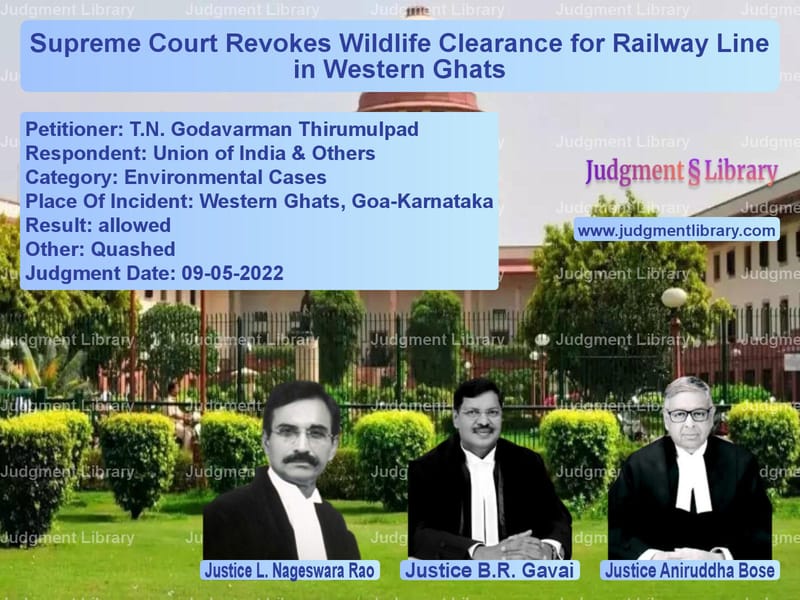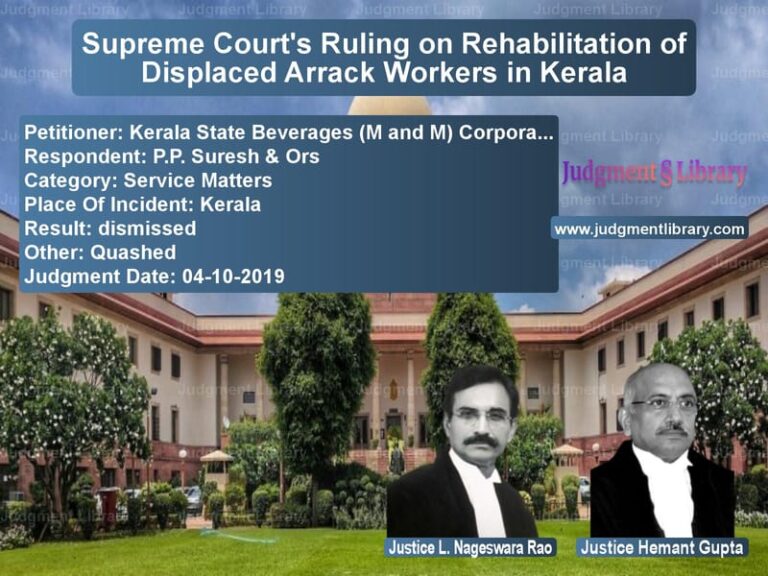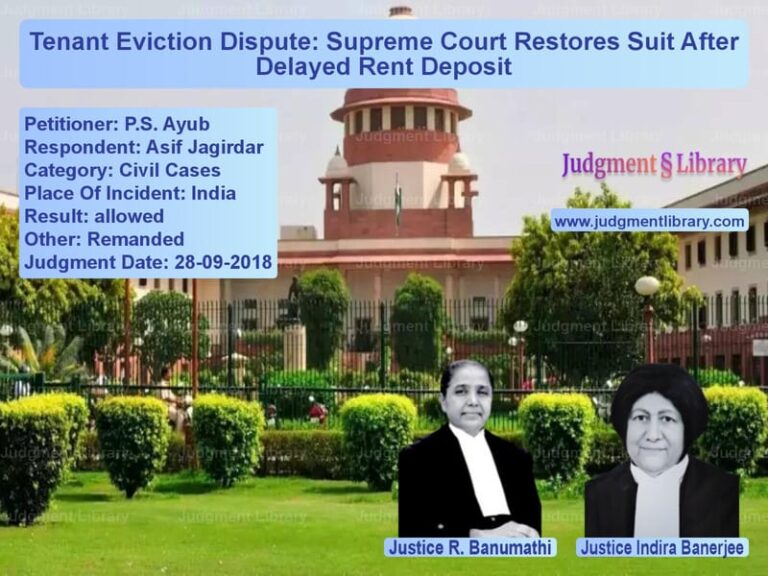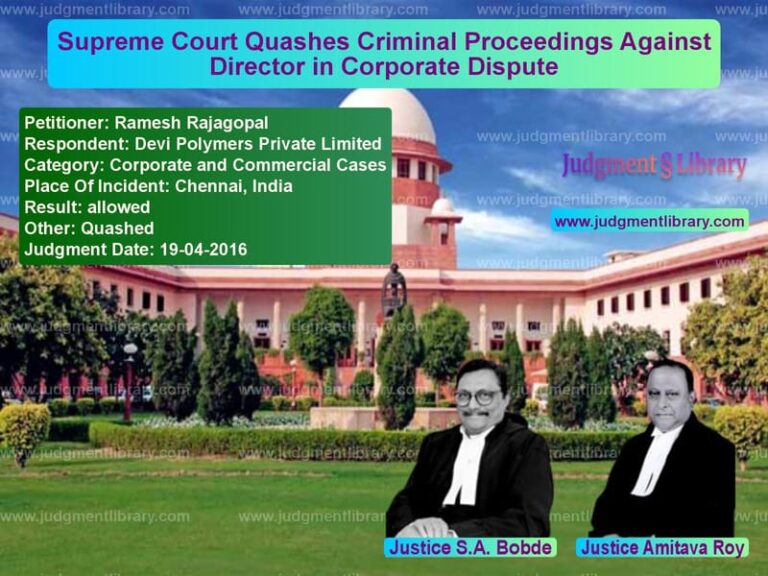Supreme Court Revokes Wildlife Clearance for Railway Line in Western Ghats
The Supreme Court of India has ruled against the doubling of the railway line from Castlerock in Karnataka to Kulem in Goa, citing environmental concerns and violations of the Wildlife Protection Act, 1972. The judgment, delivered in the case of T.N. Godavarman Thirumulpad vs. Union of India & Others, upholds the recommendation of the Central Empowered Committee (CEC) and revokes the wildlife clearance granted by the National Board for Wildlife (NBWL). This decision reinforces the Court’s commitment to environmental protection and sustainable development.
Background of the Case
The case arose from an application filed by The Goa Foundation, challenging the approval of a project that sought to double the existing railway line passing through the ecologically sensitive Western Ghats. The project involved:
- Doubling a 26 km stretch of railway line between Castlerock and Kulem.
- Impacting 120.875 hectares of protected forest land.
- Involving infrastructure such as tunnels, bridges, and land diversion.
The Goa Foundation and several environmental groups contended that the approval granted by the NBWL was in violation of the Supreme Court’s earlier orders, which mandated strict adherence to environmental guidelines.
Key Legal Issues
- Whether the project complied with the environmental safeguards mandated by the Wildlife Protection Act, 1972.
- Whether the Standing Committee of the NBWL erred in granting wildlife clearance.
- Whether the environmental impact assessment was conducted properly.
- The role of the NTCA (National Tiger Conservation Authority) in approving projects within tiger corridors.
Arguments by the Petitioner (Goa Foundation)
The Goa Foundation, represented by senior counsel, argued that:
- The project would lead to extensive deforestation and habitat fragmentation in the Western Ghats.
- No proper biodiversity assessment was conducted before granting clearance.
- The proposed railway line would pass through an important tiger corridor connecting Karnataka, Goa, and Maharashtra.
- The increase in railway traffic would severely impact wildlife movement, especially for species like tigers and elephants.
- Approval from the NTCA, as mandated under Section 38(O) of the Wildlife Protection Act, 1972, was not obtained.
Counterarguments by the Respondent (Rail Vikas Nigam Ltd.)
Rail Vikas Nigam Ltd. (RVNL) contended that:
- The railway project was critical for economic development, facilitating the transportation of goods between Goa and Karnataka.
- The project would minimize travel time and enhance railway capacity.
- Extensive mitigation measures, including the construction of overpasses and underpasses for wildlife movement, were planned.
- The Bhagwan Mahaveer Wildlife Sanctuary was not officially a tiger reserve and therefore did not require NTCA approval.
Supreme Court’s Observations
1. The Project Fails to Justify Environmental Impact
“The Ministry of Railways and RVNL have failed to provide any substantial basis for the requirement of doubling the railway line by addressing the impact which it would have on the habitat and the damage that it would cause to the environment.”
The Court emphasized that the project lacked a sound environmental justification.
2. Western Ghats is a Critical Ecological Region
“The Western Ghats is one of the world’s eight biodiversity hotspots and home to 9 tiger reserves, 20 national parks, and 68 wildlife sanctuaries. Any large-scale infrastructure project must be assessed for its long-term impact on this fragile ecosystem.”
The Court recognized the ecological importance of the Western Ghats and the need for a cautious approach.
3. Violation of Wildlife Protection Act, 1972
“The approval granted by the NBWL to go ahead with the project has been granted in respect of the Goa portion without first obtaining the advice of the NTCA as statutorily required under Section 38(O) of the Wildlife Protection Act, 1972.”
The Court noted the failure to secure mandatory approvals.
Final Judgment
The Supreme Court ruled:
- The approval granted by the NBWL for doubling the railway line was revoked.
- The Rail Vikas Nigam Ltd. must conduct a fresh cumulative environmental impact assessment before seeking approval again.
- The project’s potential impact on tiger corridors must be evaluated independently by the NTCA.
- Until a proper assessment is conducted, no construction activity shall take place.
Impact of the Judgment
This ruling has significant implications:
- Strengthened Wildlife Protection: The decision reaffirms the Court’s commitment to preserving biodiversity.
- Higher Standards for Infrastructure Projects: Large-scale projects must meet strict environmental clearance standards.
- Role of NTCA Strengthened: The ruling ensures that tiger corridors and wildlife movement are protected.
- Precedent for Future Cases: The judgment will serve as a benchmark for similar cases involving environmental clearances.
By delivering this judgment, the Supreme Court has reinforced the importance of sustainable development, balancing economic growth with the urgent need for environmental conservation.
Petitioner Name: T.N. Godavarman Thirumulpad.Respondent Name: Union of India & Others.Judgment By: Justice L. Nageswara Rao, Justice B.R. Gavai, Justice Aniruddha Bose.Place Of Incident: Western Ghats, Goa-Karnataka.Judgment Date: 09-05-2022.
Don’t miss out on the full details! Download the complete judgment in PDF format below and gain valuable insights instantly!
Download Judgment: t.n.-godavarman-thir-vs-union-of-india-&-oth-supreme-court-of-india-judgment-dated-09-05-2022.pdf
Directly Download Judgment: Directly download this Judgment
See all petitions in Environmental Cases
See all petitions in Public Interest Litigation
See all petitions in Judgment by L. Nageswara Rao
See all petitions in Judgment by B R Gavai
See all petitions in Judgment by Aniruddha Bose
See all petitions in allowed
See all petitions in Quashed
See all petitions in supreme court of India judgments May 2022
See all petitions in 2022 judgments
See all posts in Environmental Cases Category
See all allowed petitions in Environmental Cases Category
See all Dismissed petitions in Environmental Cases Category
See all partially allowed petitions in Environmental Cases Category







